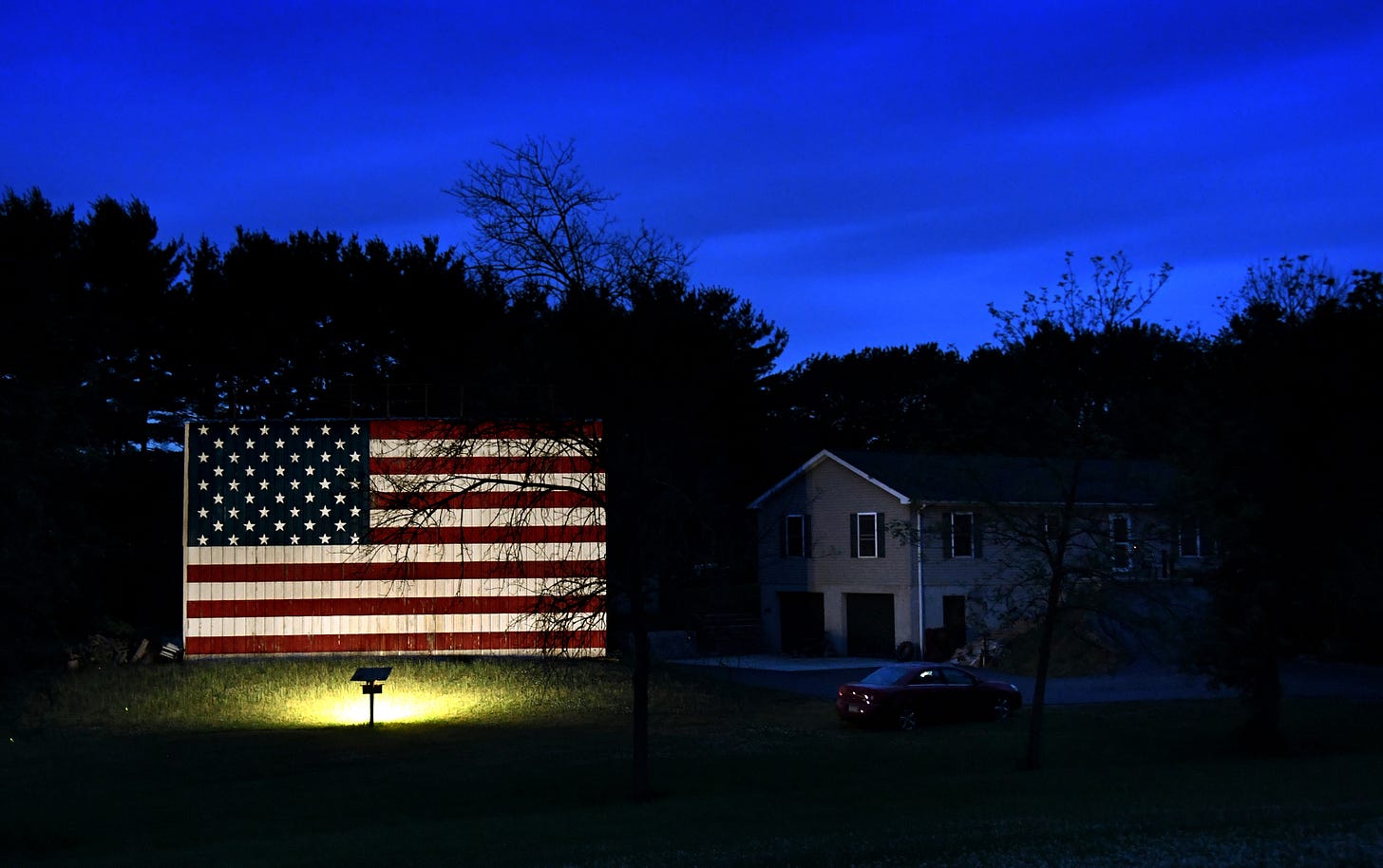Don’t Give Up on America
No previous generation abandoned this country’s ideals. We shouldn’t, either.
IN 1988, I TAUGHT A CLASS ON AMERICAN STUDIES to about 250 students, many of them from countries around the world. After discussing the theme of the Exodus, redemption, and renewal in American culture, one student came up to me and told me he was from Southeast Asia. He said, nervously but fervently, his voice cracking, “We have lived that story. We immigrated here, we worked our way out of poverty, it has become our home.” In those years before the complete collapse of the Soviet Union, I also had the good fortune to visit and work with students in Eastern Europe. Those students didn’t need to be told about the American idea. I distributed books by Thoreau and Hemingway and Faulker to great applause from students eager to learn more about America—not about its geography or even about its people, but about what it stood for, what it meant.
Today we are losing the vision of America those students had with the morning, daytime, and evening news. Darkness and shadow blot out the light of that vision that has had such special meaning for so much of humanity for centuries. Liberal democracy now confronts the driving and relentless resurgence of another tradition in American history: anti-liberal, violent, and exclusionary forces that today seem to dominate public life and activity.
The path out of our current morass is to be found in the visions of American liberal democracy now under attack. The meaning, promise, and success of the American idea, even with all of its weaknesses and contradictions, have made the strongest argument against authoritarianism and autarchy. We have a long and glorious history of renewing the American idea. Believing in and acting on that idea enabled others in our history to triumph over democracy’s enemies. But the first necessary step for democracy and freedom to triumph, the sine qua non of self-government, is keeping the faith in the American idea.
THE IDEA OF AMERICA AS NOT JUST A PLACE for a new start, but as a representation of renewal and rebirth itself, long predates the United States. John Winthrop’s sermon to the Puritan settlers confirmed, but did not invent, the idea of America as a new and transformative force in history. Winthrop proclaimed the new American Jerusalem would be a model and a beacon for the world, “as a City upon a Hill, the eyes of all people are upon us.”
For centuries, America represented a “new world” not just in a geographical but in a sociological, even a psychological sense. The Puritan mission evolved into the American mission that became a beacon to all the world’s peoples. It’s no accident that the Declaration of Independence begins not with specific complaints about the British Empire, but with universal declarations of human rights.
Like my students so many years ago, immigrants, having made their own personal new starts in America, are often the keenest observers of America and its uniqueness. In the mid-eighteenth century, Hector St. Jean de Crèvecoeur of France came to America via Canada eventually settling in New York. He described what America had come to mean for the people of the world who hoped for a new life of opportunity and possibility: “In this great American asylum, the poor of Europe have by some means met together.” Somehow, “by some means,” America became synonymous with the hope unavailable to such people anywhere else.
Just as Thomas Paine declared that America had the “power to begin the world over again,” so Crèvecoeur proclaimed America as an asylum for the creation of a new kind of society, asserting, “Here individuals of all nations are melted into a new race of men, whose labors and posterity will one day cause great changes in the world. Americans are the western pilgrims.”
Sharing Crèvecoeur’s vision of a new American identity and a new history, the minister, transcendentalist, and abolitionist Theodore Parker dubbed America’s role in the cause of freedom, “the American idea.” In Parker’s ethical imagination, the American idea promises rebirth in a new political and cultural reality. His American idea came from the work of the Founders, the ideals of the Declaration of Independence, the sacrifices and triumphs of the American Revolution, the Constitution and the Bill of Rights. He passed them on to a new generation of leaders, one of whom told a story of “a nation conceived in liberty” experiencing “a new birth of freedom.”
Yet even Parker bemoaned the loss of America’s role as a beacon of democracy and freedom. He argued that the nation’s perpetuation of the evil of slavery and its hunger to conquer new territory betrayed America’s most basic principles and exposed Americans as hypocrites. “Abroad we are looked on as a nation of swindlers and men-stealers,” he wrote. “And what can we say in our defence? Alas, the nation is a traitor to its great idea—that all men are born equal, each with the same inalienable rights.”
In the generations after Lincoln, Abraham Cahan provided a cogent example of the power of the democratic idea of America to change and regenerate life for millions of people. Among the millions of Jewish immigrants to America in the late nineteenth and early twentieth centuries, Cahan could be described as as a “convert” to the American idea as an ideology. Cahan fled to America from Lithuania (then part of the Russian Empire) hoping to find the freedom to express and act upon his socialist politics. In his autobiography, he reflected on his feelings about immigrating: “America! To go to America! To re-establish the Garden of Eden in that distant land. My spirit soared. All my other plans dissolved. I was for America!”
But, like so many millions of other immigrants, Cahan found that America changed him and how he saw life and politics:
The anarchists and even the socialists argued that there was no more freedom in America than in Russia. But that was just talk, I concluded. After all, in America there was no Czar, there were no gendarmes, no political spies. You could speak and write what you wanted! The President was elected, the governor was elected, even the congressmen who made the laws were elected.
By the time Cahan died in 1951, a new term for his understanding and love of the American idea entered into the language of American freedom. The Swedish economist Gunnar Myrdal identified what he called the “American Creed of liberty, equality, justice, and fair opportunity for everybody.”
IT IS NO LESS THAN THIS IDEA OF AMERICA, this creed, this soul of America that we now see and feel slipping away. And yet, only a revived faith in who we are, what we have been, what we have achieved can provide the energy, purpose, and direction to help us find the courage and determination to perpetuate our special democracy.
Too many of us stand weakened and diminished before the danger we face. In such a condition of dread, the paralysis will continue unabated.
In this situation of dread, panic, and uncertainty, it is worth remembering that we have been through existential threats to democracy before, and American democracy survived. In fact, danger and uncertainty are intrinsic in the American experience. Throughout our history, America has balanced the highest ideals against a severe consciousness of the fragile moral and psychological nature of humankind. Expectations of failure, weakness, and deviance always ran a parallel course with the hope to fulfill utopian ideals and hopes.
Indeed, as Myrdal argued, ugly realities and painful shortcomings energized the passion for reform and renewal to live up to the ideals and values of the American Creed. The hope for redemption and renewal thrives on the demand to overcome failure and disappointment. Much of the classics of American political rhetoric echo the Hebrew and Puritan jeremiad that balances the call for adherence to the highest ethical demands with the warnings of dire consequences or moral failure.
Historian Jon Meacham notes other elections in our history besides 2024 engendered skepticism about the depth of the the American electorate’s commitment to liberal democracy. Just a few years after the end of the Civil War, Ulysses S. Grant won the election of 1868 by just a little more than five points. The surprisingly unimpressive win for Grant suggests the relatively tepid support for the principles that motivated and defined the Union cause. Even more sobering for advocates for equality and freedom, the Democrats promoted an agenda to revoke and take back many of the advances of the civil rights gains that came as a result of the war. The vote stands as an example of the deep and perdurable strain of anti-democratic “illiberalism” or “anti-liberalism” in America.
Of course, the introduction of slavery in Virginia in 1619 established and instituted illiberalism into the American experience before the Pilgrims ever settled in New England. Slavery and the mistreatment of Native Americans epitomize the worst of anti-democratic illiberalism in America. Other obvious glaring examples of the strain of illiberalism abound: inclinations toward monarchical or aristocratic rule; corrupt government subservience to moneyed interests; segregation and Jim Crow; the disenfranchisement of women; the internment of Japanese Americans; the Klu Klux Klan; America First fascism; McCarthyism.
American democracy ultimately overcame to a considerable extent such moral and ethical outrages and challenges, leaving more no doubt to be achieved in continuing and future struggles for freedom and equality. In the past, we have come together to achieve a consensus for modernizing and advancing our democracy for all, whether such progress meant ending slavery with a Civil War or creating a New Deal for economic and political freedom and security for ordinary people.
Striving to fulfill the American Creed enabled advocates of democracy to meet its challenges and defeat its challengers. If today’s challenges seem unprecedented in American history, overcoming the threat today will require the same fortitude and commitment to the democracy of the American idea that worked in the past. That means struggling every day in the political arena, in the media, in grassroots movements, in lobbying political and community leaders.
The struggle for democracy must begin with ourselves, with what we believe and want. The struggle for freedom at home and abroad always begins an internal search for our ideals, hopes, and beliefs. Before we can take back the political system and our country, we must take back ourselves. It is an act of faith in ourselves, in our history, and in the meaning of our country.
American democracy has been attacked brutally and vociferously at times from the left and the right. It often has met indifference from all sides and directions. Once again, we face an existential crisis concerning our own individual identity as well as our national identity. As Abraham Lincoln declared, “We shall nobly save, or meanly lose, the last best hope of earth.”






